Progress of Implementation of Agriculture Export Policy
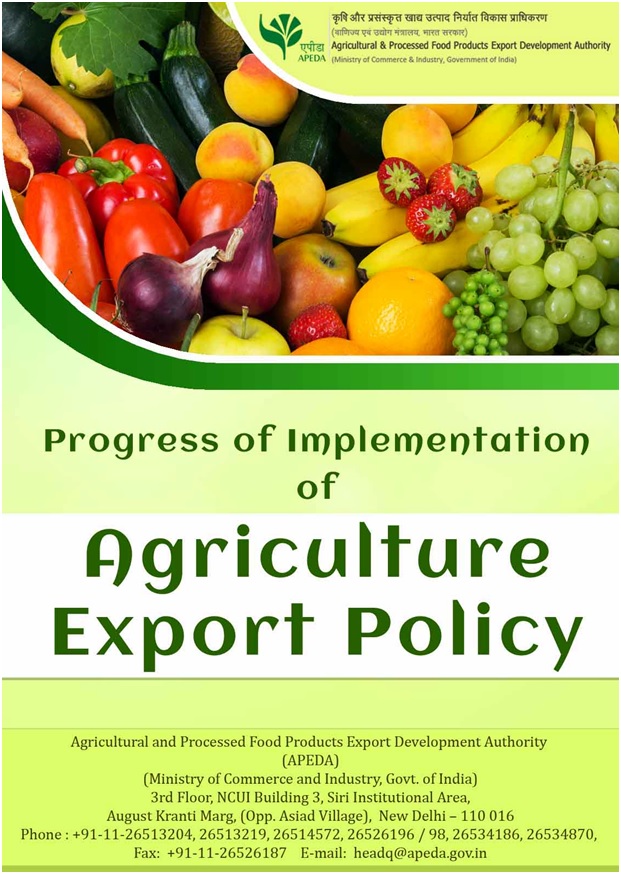 |
|||||||||||||||||||||||||||||||||||||||||||||||||||||||||||||||||||||||||||||||||||||||||||||||||||
1. TABLE OF CONTENTS |
|||||||||||||||||||||||||||||||||||||||||||||||||||||||||||||||||||||||||||||||||||||||||||||||||||
| 1. Table of Contents | |||||||||||||||||||||||||||||||||||||||||||||||||||||||||||||||||||||||||||||||||||||||||||||||||||
| 1. Introduction: | |||||||||||||||||||||||||||||||||||||||||||||||||||||||||||||||||||||||||||||||||||||||||||||||||||
| 2. Agricultural & Processed Food Products Export Development Authority (APEDA): | |||||||||||||||||||||||||||||||||||||||||||||||||||||||||||||||||||||||||||||||||||||||||||||||||||
| 3. Progress on Implementation of agriculture export Policy: | |||||||||||||||||||||||||||||||||||||||||||||||||||||||||||||||||||||||||||||||||||||||||||||||||||
| 4. Formulating of State Agricultural Export Policy: | |||||||||||||||||||||||||||||||||||||||||||||||||||||||||||||||||||||||||||||||||||||||||||||||||||
| 4.1 Reaching out to Farmer with greater involvement of the State Government for Cluster development- | |||||||||||||||||||||||||||||||||||||||||||||||||||||||||||||||||||||||||||||||||||||||||||||||||||
| 5. Diversification of export basket: | |||||||||||||||||||||||||||||||||||||||||||||||||||||||||||||||||||||||||||||||||||||||||||||||||||
| 5.1 20 Export potential products: | |||||||||||||||||||||||||||||||||||||||||||||||||||||||||||||||||||||||||||||||||||||||||||||||||||
| 5.2 20 Export potential Countries: | |||||||||||||||||||||||||||||||||||||||||||||||||||||||||||||||||||||||||||||||||||||||||||||||||||
| 6. Awareness of Agricultural Export Policy: | |||||||||||||||||||||||||||||||||||||||||||||||||||||||||||||||||||||||||||||||||||||||||||||||||||
| 7. Meeting with NABARD: | |||||||||||||||||||||||||||||||||||||||||||||||||||||||||||||||||||||||||||||||||||||||||||||||||||
| 8. Sensitization of the State Nodal Agencies: | |||||||||||||||||||||||||||||||||||||||||||||||||||||||||||||||||||||||||||||||||||||||||||||||||||
| 9. BSM cum Workshop in Clusters: | |||||||||||||||||||||||||||||||||||||||||||||||||||||||||||||||||||||||||||||||||||||||||||||||||||
| 10. MoU with National Cooperative Development Corporation & ASCI: | |||||||||||||||||||||||||||||||||||||||||||||||||||||||||||||||||||||||||||||||||||||||||||||||||||
| 11. Working with Line Ministries: | |||||||||||||||||||||||||||||||||||||||||||||||||||||||||||||||||||||||||||||||||||||||||||||||||||
| 12. Product-wise Cluster Development: | |||||||||||||||||||||||||||||||||||||||||||||||||||||||||||||||||||||||||||||||||||||||||||||||||||
| 13. Export from Clusters | |||||||||||||||||||||||||||||||||||||||||||||||||||||||||||||||||||||||||||||||||||||||||||||||||||
| 14. Cluster level committees: | |||||||||||||||||||||||||||||||||||||||||||||||||||||||||||||||||||||||||||||||||||||||||||||||||||
| 15. Market Intelligence Cell: | |||||||||||||||||||||||||||||||||||||||||||||||||||||||||||||||||||||||||||||||||||||||||||||||||||
| 16. Agri-Cells: | |||||||||||||||||||||||||||||||||||||||||||||||||||||||||||||||||||||||||||||||||||||||||||||||||||
| 17. New initiative: | |||||||||||||||||||||||||||||||||||||||||||||||||||||||||||||||||||||||||||||||||||||||||||||||||||
| 18. Appendix | |||||||||||||||||||||||||||||||||||||||||||||||||||||||||||||||||||||||||||||||||||||||||||||||||||
| 18.1 List of Clusters-APEDA 29Clusters of 12 Products in 11 States covering 67 Districts, |
|||||||||||||||||||||||||||||||||||||||||||||||||||||||||||||||||||||||||||||||||||||||||||||||||||
Abbreviations |
|||||||||||||||||||||||||||||||||||||||||||||||||||||||||||||||||||||||||||||||||||||||||||||||||||
| AEP-Agriculture Export Policy | |||||||||||||||||||||||||||||||||||||||||||||||||||||||||||||||||||||||||||||||||||||||||||||||||||
| AFC-Agricultural Finance Corporation | |||||||||||||||||||||||||||||||||||||||||||||||||||||||||||||||||||||||||||||||||||||||||||||||||||
| APEDA-Agriculture and Processed Food Products Export Development Authority | |||||||||||||||||||||||||||||||||||||||||||||||||||||||||||||||||||||||||||||||||||||||||||||||||||
| BSM-Buyer Seller Meet | |||||||||||||||||||||||||||||||||||||||||||||||||||||||||||||||||||||||||||||||||||||||||||||||||||
| DAC&FW-Department of Agriculture, Cooperation and Farmer Welfare | |||||||||||||||||||||||||||||||||||||||||||||||||||||||||||||||||||||||||||||||||||||||||||||||||||
| DAHD-Department of Animal Husbandry and Dairying | |||||||||||||||||||||||||||||||||||||||||||||||||||||||||||||||||||||||||||||||||||||||||||||||||||
| DGFT-Directorate General of Foreign Trade | |||||||||||||||||||||||||||||||||||||||||||||||||||||||||||||||||||||||||||||||||||||||||||||||||||
| DoC-Department of Commerce | |||||||||||||||||||||||||||||||||||||||||||||||||||||||||||||||||||||||||||||||||||||||||||||||||||
| DoCA-Department of Consumer Affairs | |||||||||||||||||||||||||||||||||||||||||||||||||||||||||||||||||||||||||||||||||||||||||||||||||||
| FPC-Farmer Producer Company | |||||||||||||||||||||||||||||||||||||||||||||||||||||||||||||||||||||||||||||||||||||||||||||||||||
| FPO-Farmer Producer Organization | |||||||||||||||||||||||||||||||||||||||||||||||||||||||||||||||||||||||||||||||||||||||||||||||||||
| HS-Harmonized System | |||||||||||||||||||||||||||||||||||||||||||||||||||||||||||||||||||||||||||||||||||||||||||||||||||
| ICAR-Indian Council of Agricultural Research | |||||||||||||||||||||||||||||||||||||||||||||||||||||||||||||||||||||||||||||||||||||||||||||||||||
| MoCA-Ministry of Commerce and Affairs | |||||||||||||||||||||||||||||||||||||||||||||||||||||||||||||||||||||||||||||||||||||||||||||||||||
| MoFPI-Ministry of Food Processing Industries | |||||||||||||||||||||||||||||||||||||||||||||||||||||||||||||||||||||||||||||||||||||||||||||||||||
| MPEDA-Marine Products Export Development Authority | |||||||||||||||||||||||||||||||||||||||||||||||||||||||||||||||||||||||||||||||||||||||||||||||||||
| NABARD-National Bank for Agriculture and Rural Development | |||||||||||||||||||||||||||||||||||||||||||||||||||||||||||||||||||||||||||||||||||||||||||||||||||
| NCDC-National Cooperative Development Corporation | |||||||||||||||||||||||||||||||||||||||||||||||||||||||||||||||||||||||||||||||||||||||||||||||||||
| NCUI-ational Cooperative Union of India | |||||||||||||||||||||||||||||||||||||||||||||||||||||||||||||||||||||||||||||||||||||||||||||||||||
| NSIC-National Small Industries Corporation | |||||||||||||||||||||||||||||||||||||||||||||||||||||||||||||||||||||||||||||||||||||||||||||||||||
| SFAC-Small Farmers Agribusiness Consortium | |||||||||||||||||||||||||||||||||||||||||||||||||||||||||||||||||||||||||||||||||||||||||||||||||||
| TRIFED-Tribal Cooperative Marketing Development Federation of India | |||||||||||||||||||||||||||||||||||||||||||||||||||||||||||||||||||||||||||||||||||||||||||||||||||
India with a suitable agro-climatic condition has large and diverse agriculture base. India is the leading agriculture producer for many agriculture commodities in the world. Since the Indian economy depends on agriculture, agro-processing, value additions, and agricultural exports are key for the long term and sustainable economic growth. The Agriculture Export Policy which was announced with an objective of doubling of Agri exports was framed with a focus on agriculture export-oriented production, export promotion, better price realization to farmers and synchronization within policies and programs of the Government of India. Active Participation of State governments is the key in the implementation of Agriculture export policy (AEP). Export promotion is another important activity envisaged in AEP for India to sustain in global Agri trade and hence the role of export promotions agencies like APEDA, MPEDA, Tea Board, Coffee and Spices Board is significant. Similarly, all Line Ministries (DAC&FW, DAHD, MoFPI, MoCA etc.) also need to work in tandem and coordinate to cohesively work together to address each and every component detailed in the policy along with the roles and responsibility of other stakeholders. |
|||||||||||||||||||||||||||||||||||||||||||||||||||||||||||||||||||||||||||||||||||||||||||||||||||
The Agricultural and Processed Food Products Export Development Authority (APEDA) was established by the Government of India under the Agricultural and Processed Food Products Export Development Authority Act passed by the Parliament in December 1985. The Act (2 of 1986) came into effect from 13th February, 1986 by a notification issued in the Gazette of India. APEDA fosters the development and promotion of the export of scheduled products. It provides financial assistance for the development of export infrastructure, quality development and market development for the promotion and export of scheduled products under the broad categories of floriculture and seeds, fruits and vegetables, processed foods and vegetables, animal products and cereals covering more than 700 tariff lines on 8 digit HS Code. The export of APEDA products is around USD 18.7 billion out of total export of agri products of USD 38.5 billion, which constitutes around 48.6% of the total agriculture exports. |
|||||||||||||||||||||||||||||||||||||||||||||||||||||||||||||||||||||||||||||||||||||||||||||||||||
APEDA has been adopting a focused approach for effective implementation of Agri Export Policy (AEP). APEDA held series of meetings and has been taking various initiatives for the implementation of agriculture export policy. The details of the progress made by APEDA so far for the implementation of agricultural export policy have been highlighted in this booklet.
|
|||||||||||||||||||||||||||||||||||||||||||||||||||||||||||||||||||||||||||||||||||||||||||||||||||
The active role of States is crucial in implementation of agricultural state policy. APEDA has regularly been interacting with the states to propel them to include agricultural exports in their respective State Export Policy. The indicative required interventions under the supply chain were prepared by APEDA in consultation with state governments' officials to enable them in finalization of State specific Action Plan and formed a state level monitoring committee. The states of Maharashtra, U.P., Kerala, Nagaland, Tamil Nadu, Assam, Punjab, Karnataka, Gujarat, Rajasthan, Andhra Pradesh, Telangana, Manipur, Sikkim and Uttrakhand have finalized the State-specific Action Plan while other states are at different level of finalization of the action plan. The states that are likely to finalize their AEP plan in next 2 months are Odisha, Meghalaya and Arunachal Pradesh. Along with this 26 States & 4 UTs have nominated state Nodal agencies. APEDA has nominated one nodal officer for each State to coordinate various activities for effective implementation of agricultural export policy. Thus, APEDA has been supporting in developing state agriculture export policy which will ultimately help the states in implementation of agriculture export policy and enhancing their export performance.
|
|||||||||||||||||||||||||||||||||||||||||||||||||||||||||||||||||||||||||||||||||||||||||||||||||||
Since agricultural and land are State subjects this require State Government to extend full cooperation in reaching out to the farmers, identifying Agri potential, detailing with to interventions required for productivity and quality improvements, judicious use of pesticides, capacity building requirements, Infrastructures and logistics gap under cluster development approach, exit point issues, etc. APEDA is pursuing with the State Government Nodal agencies for their close coordination with other agencies to address the respective intervention in the State for Agri export. A proposal was submitted to DoC for consideration and notification of 142 additional clusters as proposed by 20 States in their respective State action plans. APEDA is also collaborating with SFAC, NCDC, NABARD, TRIFED etc. to bring in FPOs and Cooperatives at the cluster level for consolidation of the produce.
|
|||||||||||||||||||||||||||||||||||||||||||||||||||||||||||||||||||||||||||||||||||||||||||||||||||
APEDA has focused on diversification of current export basket and exploring newer markets for existing and new products. It has identified the top 10 products, top 10 countries and 20 export potential products, 20 potential countries for increasing exports. This will help in enhancing the export potential of Indian agriculture and to make India a global power in agriculture trade. It gradually raises farmer's income and it will help in doubling of agriculture exports.
|
|||||||||||||||||||||||||||||||||||||||||||||||||||||||||||||||||||||||||||||||||||||||||||||||||||
Table 1: Top 10 Present Export Products |
|||||||||||||||||||||||||||||||||||||||||||||||||||||||||||||||||||||||||||||||||||||||||||||||||||
|
|||||||||||||||||||||||||||||||||||||||||||||||||||||||||||||||||||||||||||||||||||||||||||||||||||
Table 2: Top 10 Present Export countries |
|||||||||||||||||||||||||||||||||||||||||||||||||||||||||||||||||||||||||||||||||||||||||||||||||||
|
|||||||||||||||||||||||||||||||||||||||||||||||||||||||||||||||||||||||||||||||||||||||||||||||||||
Banana, Potato, Fresh Flower, Dried Flower, Vegetable Seeds, Juices & Concentrated, Jaggery, Ready To Eat (Ethnic Food), Individual Quick Freezing, Cereal Preparations, Pig meat, Poultry, Dairy Products, Moringa, Millet & Millet Products, Makhana, Potato Flakes/Powder, Biscuits, Wine, Organic Products.
Moreover, recently a report was compiled towards analysis of challenges and interventions proposed for 20 Potential export products for deeper penetration of increasing exports. |
|||||||||||||||||||||||||||||||||||||||||||||||||||||||||||||||||||||||||||||||||||||||||||||||||||
Argentina, Australia, Brazil, China, Egypt, France, Germany, Hong Kong, Italy, Japan, Netherlands, New Zealand, Oman, Philippines, Qatar, Russia, Singapore, South Korea, Sri Lanka, UK .
|
|||||||||||||||||||||||||||||||||||||||||||||||||||||||||||||||||||||||||||||||||||||||||||||||||||
To accelerate agri export policy it is primarily necessary that there is awareness among the potential stakeholders like farmers, exporters, and others concerned in this area. For this purpose, APEDA has conducted State level awareness programs on Agriculture Export Policy organized on 8th January, 2019 in Delhi, 2nd February, 2019 in Pune and 13th February, 2019 in Guwahati. This has sensitized large number of different stakeholders for implementation of agriculture export policy.
|
|||||||||||||||||||||||||||||||||||||||||||||||||||||||||||||||||||||||||||||||||||||||||||||||||||
A Consultative Meet of Stakeholders was organized by NABARD at their head quarter in Mumbai on 9th August 2019. The meeting was co-chaired by Commerce Secretary and Chairman NABARD and was attended by Secretary Ministry of Food Processing Industries (MoFPI), Additional Secretary Department of Agriculture & Cooperation and Farmer's Welfare (DAC&FW), Joint Secretary, Department of Fisheries (DoF), Joint Secretary, Department of Commerce (DoC), senior officials from State Governments, DGFT. APEDA made a detail presentation in the meeting on the implementation of agriculture export policy. In this meeting APEDA requested the representatives from the respective State Govt. to take action on following.
|
|||||||||||||||||||||||||||||||||||||||||||||||||||||||||||||||||||||||||||||||||||||||||||||||||||
1. Finalize & submit State Specific Action Plans for the implementation of AEP.
|
|||||||||||||||||||||||||||||||||||||||||||||||||||||||||||||||||||||||||||||||||||||||||||||||||||
2. Expedite the cluster development plan & organizing of FPOs.
|
|||||||||||||||||||||||||||||||||||||||||||||||||||||||||||||||||||||||||||||||||||||||||||||||||||
3. Assess infrastructure, logistic gaps & pre & post-harvest interventions.
|
|||||||||||||||||||||||||||||||||||||||||||||||||||||||||||||||||||||||||||||||||||||||||||||||||||
In addition, a visit was also organized for Trade Advisor, DAC&FW in January, 2020 to the Banana cluster in Surat, Gujrat. It included a farm visit followed by interaction with Farmer cooperatives, banana processing at APEDA funded pack house and stakeholders meeting.
|
|||||||||||||||||||||||||||||||||||||||||||||||||||||||||||||||||||||||||||||||||||||||||||||||||||
Figure 1: Consultative Meet of Stakeholders at NABARD |
|||||||||||||||||||||||||||||||||||||||||||||||||||||||||||||||||||||||||||||||||||||||||||||||||||
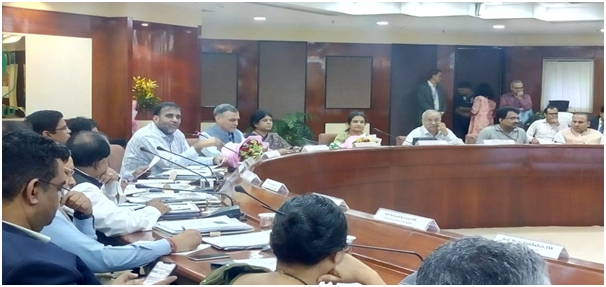 |
|||||||||||||||||||||||||||||||||||||||||||||||||||||||||||||||||||||||||||||||||||||||||||||||||||
The active role of notified state nodal agencies in respective state is crucial for implementation agriculture export policy. Therefore, APEDA had organized a Workshop on the Role of State Nodal agencies in Agriculture exports at APEDA HQ on 3rd September 2019. In this workshop 22 States had actively participated and shared their valuable inputs, experiences and concerns regarding implementing of agricultural export policy. Senior officials from Line Ministries, Central agencies attended the program and apprised about the role of their organizations for the benefit of Agri exports
State Nodal agencies are pursued for formation of Help desk/Control room in their states to address the issues faced by agri/horticulture stakeholders during lockdown due to COVID-19 pandemic. 18 states & 1UT have so far set up such facilities |
|||||||||||||||||||||||||||||||||||||||||||||||||||||||||||||||||||||||||||||||||||||||||||||||||||
Figure 2: Workshop on the Role of State Nodal agencies in Agriculture exports |
|||||||||||||||||||||||||||||||||||||||||||||||||||||||||||||||||||||||||||||||||||||||||||||||||||
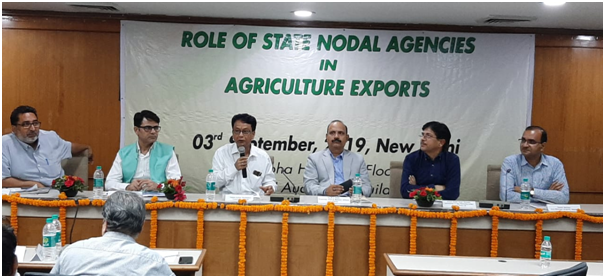 |
|||||||||||||||||||||||||||||||||||||||||||||||||||||||||||||||||||||||||||||||||||||||||||||||||||
APEDA organized another meeting with Nodal Agencies on "Progress on Implementation of AEP & Strategy for Cluster Development" on 06th February 2020 at Delhi. In this meeting 25 States and 1 UT had actively participated and shared their valuable inputs, experiences and concerns regarding implementing of agricultural export policy. Commerce Secretary, senior officials from Line Ministries, Central agencies attended the program and apprised about the role of their organizations for the benefit of agri exports.
|
|||||||||||||||||||||||||||||||||||||||||||||||||||||||||||||||||||||||||||||||||||||||||||||||||||
Figure 3: 2nd Meeting on implementation of AEP with State Nodal agencies |
|||||||||||||||||||||||||||||||||||||||||||||||||||||||||||||||||||||||||||||||||||||||||||||||||||
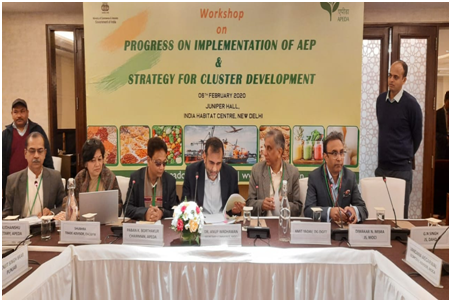 |
|||||||||||||||||||||||||||||||||||||||||||||||||||||||||||||||||||||||||||||||||||||||||||||||||||
Since FPOs and Exporters are major players for the development of clusters their cooperation and coordination is important for the development of export, APEDA conducted BSM cum workshop in various identified export clusters. The BSM cum workshops (between exporter and FPOs) were organized at M.P Ujjain (Orange) on 11th October 2019, Mehboob nagar (Mango) on 15th October 2019, Odisha Kandhamal (Organic Turmeric, ginger) on 17th October 2019, Karnataka Chitradurga (Pomegranate) on 24th October 2019, Meghalaya (Organic Turmeric) on 2nd November 2019, Shimla on 14th November 2019, Andhra Pradesh Kadapa (Banana) on 19th November 2019, Kolkata (Fresh vegetables) and Agartala, Tripura (Pineapple) on 29th November 2019, Nagpur (Orange) on 6th December 2019, Sangli (Raisins) on 19th December 2019, Mahbubabad (Mango) on 16th December 2019, Sangareddy (Mango) on 18th December 2019, Dehradun on 30thDecenber 2019 and Uttarakhand on 30th December2019 . Further, a Farmer Connect Portal has been set up by APEDA on its website for providing a platform for FPOs, Cooperatives to interact with exporters. Around 2718 FPO/FPCs have been registered in the portal so far.
|
|||||||||||||||||||||||||||||||||||||||||||||||||||||||||||||||||||||||||||||||||||||||||||||||||||
Glimpses of BSM cum Workshop in Clusters
|
|||||||||||||||||||||||||||||||||||||||||||||||||||||||||||||||||||||||||||||||||||||||||||||||||||
Figure 4: BSM cum Workshop in West Bengal |
|||||||||||||||||||||||||||||||||||||||||||||||||||||||||||||||||||||||||||||||||||||||||||||||||||
 |
|||||||||||||||||||||||||||||||||||||||||||||||||||||||||||||||||||||||||||||||||||||||||||||||||||
Figure 5: BSM cum Workshop in Madhya Pradesh |
|||||||||||||||||||||||||||||||||||||||||||||||||||||||||||||||||||||||||||||||||||||||||||||||||||
 |
|||||||||||||||||||||||||||||||||||||||||||||||||||||||||||||||||||||||||||||||||||||||||||||||||||
Figure 6: BSM cum Workshop in Andhra Pradesh |
|||||||||||||||||||||||||||||||||||||||||||||||||||||||||||||||||||||||||||||||||||||||||||||||||||
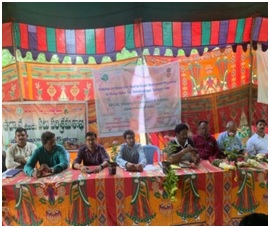 |
|||||||||||||||||||||||||||||||||||||||||||||||||||||||||||||||||||||||||||||||||||||||||||||||||||
Figure 7: BSM cum Workshop in Telangana |
|||||||||||||||||||||||||||||||||||||||||||||||||||||||||||||||||||||||||||||||||||||||||||||||||||
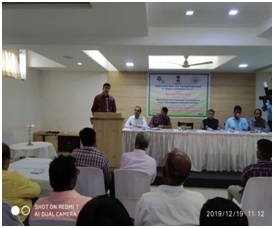 |
|||||||||||||||||||||||||||||||||||||||||||||||||||||||||||||||||||||||||||||||||||||||||||||||||||
APEDA contributed in five VC meetings organized by MIDH, DAC&FW regarding development of horticulture clusters for Banana, Apple, Pineapple/Turmeric, Mango, Grapes/ Pomegranate and provided inputs about APEDA existing infrastructure and cluster development initiatives taken under implementation of Agri export policy during the meetings.
After the first three meetings with UAE, Kuwait and Indonesia, another Virtual BSM was organized with Iran on 13th October, 2020. EoI, importers, Exporters and Product associations from India participated. The virtual BSM was joined by Ambassador of Embassy of India, Director APEDA and & Trade Advisor, DAC&FW. Sectorial presentations of important product categories such as Fresh fruits and vegetables, processed food, basmati rice, non basmati rice, animal products and organic were made through trade associations. E-catalogue was also released having details of importers, exporters, product associations and State Nodal agencies. Similar virtual BSMs have been planned with other potential importing countries.
|
|||||||||||||||||||||||||||||||||||||||||||||||||||||||||||||||||||||||||||||||||||||||||||||||||||
APEDA has signed MoU with the National Cooperative Development Corporation (NCDC) to include co-operatives in the implementation of agriculture export policy. The objective of MoU was to jointly work with NCDC in the interest of agriculture and allied sectors for bringing better value to the cooperatives through a variety of activities including an export focus in line with the policies of Government. Subsequently, APEDA organized a two-day training program on export management for cooperatives in Gurugram on 09th and 10th September and India International Cooperatives Trade Fair (IICTF) was organized between 11th -13th October 2019 at Pragati Maidan. This will synergise and strengthen joint efforts between APEDA & NCDC for effective implementation of agriculture export policy.
Similarly another MoU was signed with Administrative Staff College of India (ASCI) and Quality Control Council of India (QCI) on 18th Feburary2020 which was followed by signing of MoUs with TRIFED and SFAC for mutual cooperation and taking the valuable services of capacity building and consultancy from the reputed premier management institution of India. MoUs have been signed with NCUI and AFC India Ltd to facilitate the Farmer Cooperatives/ FPOs and development of clusters under Agri Export Policy. The proposals of AFC India Ltd for Agriculture Export based on their model for Developing Export Oriented Agri & Horti-Enterprise for enhancing the farmers' income has been sent to the respective Chief Secretaries and APC/Director, Agriculture/Horticulture of Jharkhand, Odisha & Madhya Pradesh An initiative was taken for collaboration with ICAR institutions in focused areas for cluster development. Letters have been sent to 5NRCs of identified products and DDG-ICAR for signing of MoU. Similarly, other organizations like NABARD, NSIC are being pursued for further collaboration. |
|||||||||||||||||||||||||||||||||||||||||||||||||||||||||||||||||||||||||||||||||||||||||||||||||||
The Coordinated efforts of various line ministries are required for effective implementation of agriculture export policy. APEDA has taken initiative to work with line ministries for effective implementation of agriculture export policy. APEDA has been interacting with Line Ministries on regular basis and has attended various review meetings taken at different level of senior government officials. APEDA has shared list of interventions to be addressed by various Line Ministries and has been following up with each of them.
|
|||||||||||||||||||||||||||||||||||||||||||||||||||||||||||||||||||||||||||||||||||||||||||||||||||
Twenty seven Cluster level visits in various States pertaining to 12 Products under AEP were made during October 2019 to February 2020. These visits focused on formation of Cluster facilitation cell, meetings with stakeholders and identification of gaps for further action [Refer to the Appendix Table at end]. APEDA Nodal officers visited Product clusters at Jalandhar (Potato), Jodhpur (Isabgol), Banaskantha (Dairy products), Sangli (Grapes), Solapur (Pomegranate), Nagpur (Orange), Chittoor (Mango), Theni (Banana), Salem (Poultry products), Indore (Onion) and Chikaballapura (Rose onion), Mango cluster (Lucknow, Ratnagiri, Valsad, Warangal), Banana (Thrissur, Kadapa, Solapur, Surat), Pomegranate (Kurnool, Khargone, Chiradurga), Onion (Nasik), Potato (Agra, Banaskantha, Indore), Orange (Chindwara) and Dairy products (Mathura).
|
|||||||||||||||||||||||||||||||||||||||||||||||||||||||||||||||||||||||||||||||||||||||||||||||||||
Glimpses of Cluster visits by AEP Nodal officers |
|||||||||||||||||||||||||||||||||||||||||||||||||||||||||||||||||||||||||||||||||||||||||||||||||||
Figure 8: Meeting at DC office, Theni visit |
|||||||||||||||||||||||||||||||||||||||||||||||||||||||||||||||||||||||||||||||||||||||||||||||||||
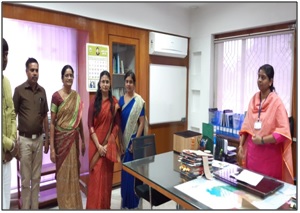 |
|||||||||||||||||||||||||||||||||||||||||||||||||||||||||||||||||||||||||||||||||||||||||||||||||||
Figure 9: Discussion with local farmers during field |
|||||||||||||||||||||||||||||||||||||||||||||||||||||||||||||||||||||||||||||||||||||||||||||||||||
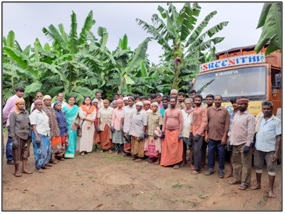 |
|||||||||||||||||||||||||||||||||||||||||||||||||||||||||||||||||||||||||||||||||||||||||||||||||||
Figure 10: Field visit in Orange farms at Katol |
|||||||||||||||||||||||||||||||||||||||||||||||||||||||||||||||||||||||||||||||||||||||||||||||||||
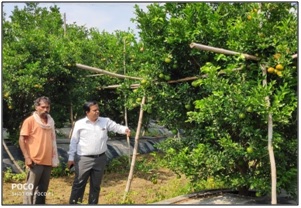 |
|||||||||||||||||||||||||||||||||||||||||||||||||||||||||||||||||||||||||||||||||||||||||||||||||||
Figure 11: Cluster level meeting in Isabgol cluster |
|||||||||||||||||||||||||||||||||||||||||||||||||||||||||||||||||||||||||||||||||||||||||||||||||||
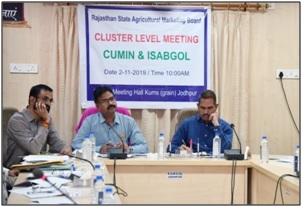 |
|||||||||||||||||||||||||||||||||||||||||||||||||||||||||||||||||||||||||||||||||||||||||||||||||||
Figure 12: Visit to Thavar Milk producer Coop soc |
|||||||||||||||||||||||||||||||||||||||||||||||||||||||||||||||||||||||||||||||||||||||||||||||||||
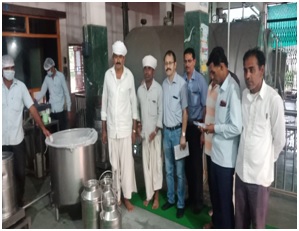 |
|||||||||||||||||||||||||||||||||||||||||||||||||||||||||||||||||||||||||||||||||||||||||||||||||||
Figure 13: Meeting at DC office, Salem village |
|||||||||||||||||||||||||||||||||||||||||||||||||||||||||||||||||||||||||||||||||||||||||||||||||||
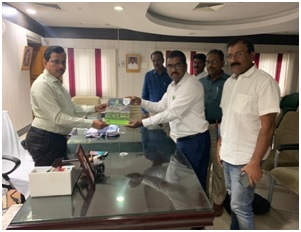 |
|||||||||||||||||||||||||||||||||||||||||||||||||||||||||||||||||||||||||||||||||||||||||||||||||||
For developing the notified clusters, two round of meetings have been organised in the clusters and as an outcome, the existing infrastructure and interventions required have been mapped. 32 meetings in the second round of cluster development through virtual mode have been organised since the last week of July, 2020.
|
|||||||||||||||||||||||||||||||||||||||||||||||||||||||||||||||||||||||||||||||||||||||||||||||||||
Figure 14: Fresh vegetables sorting/ grading/ packing At Concor perishable facility, Rajatalab |
|||||||||||||||||||||||||||||||||||||||||||||||||||||||||||||||||||||||||||||||||||||||||||||||||||
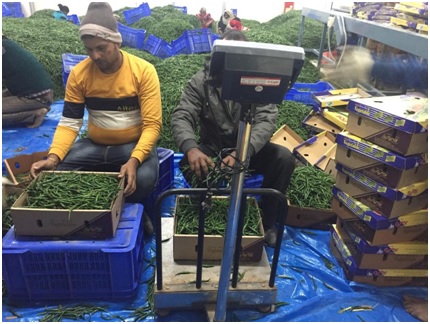 |
|||||||||||||||||||||||||||||||||||||||||||||||||||||||||||||||||||||||||||||||||||||||||||||||||||
Figure 15: Chairman APEDA & Secretary APEDA at the Concor facility along with Director DoC & UP State Officials |
|||||||||||||||||||||||||||||||||||||||||||||||||||||||||||||||||||||||||||||||||||||||||||||||||||
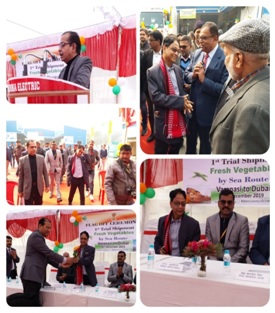 |
|||||||||||||||||||||||||||||||||||||||||||||||||||||||||||||||||||||||||||||||||||||||||||||||||||
APEDA has identified following gaps in visited clusters, as under:
|
|||||||||||||||||||||||||||||||||||||||||||||||||||||||||||||||||||||||||||||||||||||||||||||||||||
•Requirement of Area expansion at the farm level.
|
|||||||||||||||||||||||||||||||||||||||||||||||||||||||||||||||||||||||||||||||||||||||||||||||||||
•Implementation of Good Agricultural Practices.
|
|||||||||||||||||||||||||||||||||||||||||||||||||||||||||||||||||||||||||||||||||||||||||||||||||||
•Improvement in harvesting practices.
|
|||||||||||||||||||||||||||||||||||||||||||||||||||||||||||||||||||||||||||||||||||||||||||||||||||
•Formation on new FPOs/FPCs/Co-operatives existing.
|
|||||||||||||||||||||||||||||||||||||||||||||||||||||||||||||||||||||||||||||||||||||||||||||||||||
•Requirement of Planting material/certified seeds and existing distribution mechanism.
|
|||||||||||||||||||||||||||||||||||||||||||||||||||||||||||||||||||||||||||||||||||||||||||||||||||
•Requirement of Recommended list of Pesticides and label claim and existing distribution and control mechanism for use of unauthorized pesticide.
|
|||||||||||||||||||||||||||||||||||||||||||||||||||||||||||||||||||||||||||||||||||||||||||||||||||
•Pest free area.
|
|||||||||||||||||||||||||||||||||||||||||||||||||||||||||||||||||||||||||||||||||||||||||||||||||||
•Availability of electricity supply.
|
|||||||||||||||||||||||||||||||||||||||||||||||||||||||||||||||||||||||||||||||||||||||||||||||||||
•Integrated Pest and Disease Management.
|
|||||||||||||||||||||||||||||||||||||||||||||||||||||||||||||||||||||||||||||||||||||||||||||||||||
•Requirement of Up-gradation of Package of practices.
|
|||||||||||||||||||||||||||||||||||||||||||||||||||||||||||||||||||||||||||||||||||||||||||||||||||
•Present level of Organic Production and farm certification
|
|||||||||||||||||||||||||||||||||||||||||||||||||||||||||||||||||||||||||||||||||||||||||||||||||||
•Requirement of Training for the State Horti Officials/NPPO officials/ Farmers.
|
|||||||||||||||||||||||||||||||||||||||||||||||||||||||||||||||||||||||||||||||||||||||||||||||||||
•Requirement of infrastructure development (Integrated Pack house, Cold storage, Collection centre, Testing Labs, Transportation/Reefer Van /reefer container plug-in points, Processing unit for value added products).
|
|||||||||||||||||||||||||||||||||||||||||||||||||||||||||||||||||||||||||||||||||||||||||||||||||||
•Farmer registration in APEDA Hortinet.
|
|||||||||||||||||||||||||||||||||||||||||||||||||||||||||||||||||||||||||||||||||||||||||||||||||||
As an outcome of the cluster visits by APEDA nodal officers following consignments were exported.
|
|||||||||||||||||||||||||||||||||||||||||||||||||||||||||||||||||||||||||||||||||||||||||||||||||||
1. From Nagpur cluster district, the first container of 15 MT of Nagpur Oranges was flagged off for Dubai from VHT packhouse, Vashi on 13th Feburary2020. Oranges were directly procured from Nagpur cluster farmers and brought to Mumbai for container stuffing. Till date, more than 100MT of oranges have been exported to UAE and supplied to top super markets i.e. Lulu Super mart, Safari Mall, Nesto. The exporters involved were SDF productions, Fair Exports and M/s. Mitray (Nagpur based FPC)
|
|||||||||||||||||||||||||||||||||||||||||||||||||||||||||||||||||||||||||||||||||||||||||||||||||||
2. The first Trial Sea shipment of 14MT Fresh vegetables (green chilies) export to Dubai was arranged and flagged off by Chairman, APEDA on 20th December 2019 after the procurement and sorting, grading, packing of produce took place at the Concor perishable cargo facility, Rajatalab at Varanasi cluster region. As an outcome of this export promotion activity, farmers in the region received reasonably good prices for their Fresh produce, which was almost double than what they used to get from the local market earlier. Another consignment of 2.7 MT of Fresh vegetables was dispatched from Varanasi to London by air via Delhi. The first air shipment of 3 MT of Fresh mangoes (Dasheri/Langra) routed through multimodal mode from Varanasi-Lucknow-Delhi to Dubai was shipped on 30May, 2020 via Air India flight.
|
|||||||||||||||||||||||||||||||||||||||||||||||||||||||||||||||||||||||||||||||||||||||||||||||||||
Figure 16: Chairman APEDA flagging off 1st Trial sea shipment of Fresh vegetables |
|||||||||||||||||||||||||||||||||||||||||||||||||||||||||||||||||||||||||||||||||||||||||||||||||||
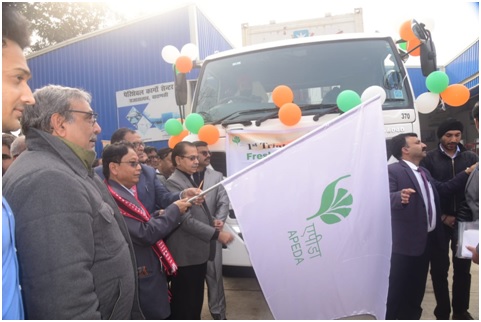 |
|||||||||||||||||||||||||||||||||||||||||||||||||||||||||||||||||||||||||||||||||||||||||||||||||||
Figure 17: VAFA flagging off 1st Trial Sea shipment to Dubai |
|||||||||||||||||||||||||||||||||||||||||||||||||||||||||||||||||||||||||||||||||||||||||||||||||||
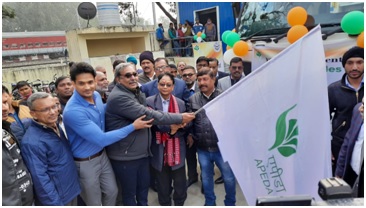 |
|||||||||||||||||||||||||||||||||||||||||||||||||||||||||||||||||||||||||||||||||||||||||||||||||||
3. With the support of APEDA and State Government of Andhra Pradesh, Desai Fruits Venture (DFV), one of the largest APEDA member Exporter of banana, dispatched the first train shipment of banana from Tadipatri, Ananthpur (Banana Cluster) in Andhra Pradesh to JNPT Mumbai on 30th January, 2020. The shipment was jointly flagged off with 43 reefer containers loaded with 890 MTs of high quality Bananas to JNPT for multiple importing countries in presence of DFV, APEDA, Sate Government of AP. Till date, 9790 MT of banana from the cluster district has been dispatched through 11 reefer rail movements for export to Middle East thereby covering 600 Ha of cultivation land and benefiting around 15,000 farmers and many FPOs in the region.
|
|||||||||||||||||||||||||||||||||||||||||||||||||||||||||||||||||||||||||||||||||||||||||||||||||||
4. Sea shipment of 20' refer container of Cavendish banana was sent to Maldives through Tuticorin port on 25th Feburary, 2020 from the Cumbum area of Theni cluster, Tamil Nadu. The banana consignment was packed and loaded in local pack house after the fresh produce was procured from FPO named Western Ghat banana producer group including 25 farmers. Further 450 MT of G9 banana supplied by the above mentioned FPO, was exported to Middle East by exporters Greener Agro and Desai Fruits & vegetables from the cluster.
|
|||||||||||||||||||||||||||||||||||||||||||||||||||||||||||||||||||||||||||||||||||||||||||||||||||
5. The first an ever-Fresh Mango consignment was routed from Varanasi to London (via Lucknow by road and by Air to Delhi from Lucknow Airport).The consignment of fresh Mangoes (Banarasi Langra, Ramkheda, Chausa etc.) with a volume of 1.20 MT was sent through the National Carrier - Air India on 16th June, 2020. With the facilitation of APEDA, the produce was supplied by three FPOs viz. M/s. Jaya Seed Agro, Ishani Agro, Shivansh Agro enabling the export of mangoes to London. Mangos were Exported by initiative of APEDA, Ministry of Commerce, Ministry of Civil Aviation, and State Govt of UP during Covid-19 period, a multi modal connection from Varanasi- Lucknow Pack House- Lucknow Airport- Delhi Airport- London was executed .
|
|||||||||||||||||||||||||||||||||||||||||||||||||||||||||||||||||||||||||||||||||||||||||||||||||||
Figure 18: Flag off of Air shipment of mangoes to London by Divisional Commissioner, Varanasi |
|||||||||||||||||||||||||||||||||||||||||||||||||||||||||||||||||||||||||||||||||||||||||||||||||||
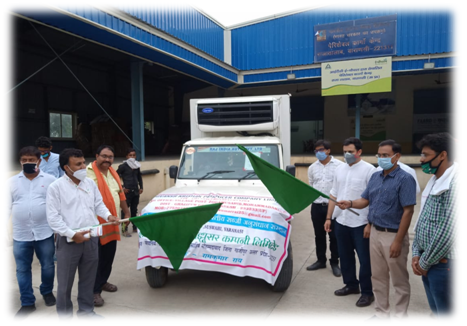 |
|||||||||||||||||||||||||||||||||||||||||||||||||||||||||||||||||||||||||||||||||||||||||||||||||||
6. On 17June, 2020 APEDA organised the first an ever mango (Dasheri, Langra) export by sea route to Oman from Lucknow. It was a Multi modal logistics connection from Lucknow Pack House to JNPT, Mumbai from where it will be shipped to Oman. The shipment of fresh Mangoes having a volume of 26.25 MTs was flagged off by Hon'ble Agriculture Minister, Govt of UP. With the facilitation of APEDA the produce was exported by M/s. Shahnaz Export. This is the result of collaborative efforts demonstrated by all the concerned agencies-APEDA, Mandi Parishad, Govt of UP, ICAR-CISH, Exporter, Pack House, Freight forwarder and shipping line who all worked together to make this possible.
|
|||||||||||||||||||||||||||||||||||||||||||||||||||||||||||||||||||||||||||||||||||||||||||||||||||
Figure 19: First ever mango export by sea flagged off by Hon’ble Agriculture Minister, Govt of UP |
|||||||||||||||||||||||||||||||||||||||||||||||||||||||||||||||||||||||||||||||||||||||||||||||||||
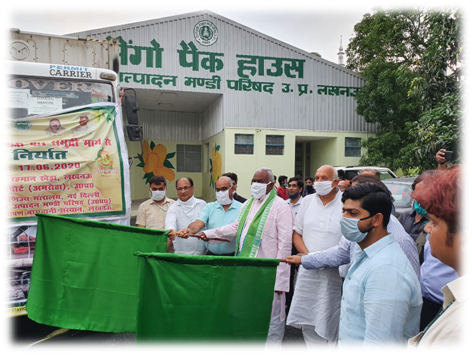 |
|||||||||||||||||||||||||||||||||||||||||||||||||||||||||||||||||||||||||||||||||||||||||||||||||||
7. Exports of Fresh horticulture produce took place by multimodal mode and consignments were shipped by air and sea to Dubai from Varanasi, Lucknow, Nagpur cluster regions:
|
|||||||||||||||||||||||||||||||||||||||||||||||||||||||||||||||||||||||||||||||||||||||||||||||||||
i) On 15 October, 2020 an air consignment of 1.10MT of Fresh vegetables procured from Lucknow and Varanasi region was shipped to Dubai.
|
|||||||||||||||||||||||||||||||||||||||||||||||||||||||||||||||||||||||||||||||||||||||||||||||||||
ii) After procuring the produce from the farmers in the cluster, the first container of Ambiyabahar season Oranges was dispatched from VHT facility at Navi Mumbai to Dubai on 27 October, 2020.
|
|||||||||||||||||||||||||||||||||||||||||||||||||||||||||||||||||||||||||||||||||||||||||||||||||||
Subsequent to the cluster visits by APEDA nodal officers, as of now twenty Cluster level committees have been formed in the clusters of:
|
|||||||||||||||||||||||||||||||||||||||||||||||||||||||||||||||||||||||||||||||||||||||||||||||||||
|
|||||||||||||||||||||||||||||||||||||||||||||||||||||||||||||||||||||||||||||||||||||||||||||||||||
| This committee ensures better implementation of agriculture export policy at the respective clusters. | |||||||||||||||||||||||||||||||||||||||||||||||||||||||||||||||||||||||||||||||||||||||||||||||||||
Market information and intelligence are crucial to enable farmers and traders to make informed decisions about what to grow, when to harvest, to which markets produce should be sent, and whether to store it or not. The most important marketing intelligence need of the farmer is price intelligence. A Market Intelligence Cell has been constituted in APEDA and the activity of dissemination of E-market intelligence reports comprising detailed market analysis has commenced. Till now 27 reports have been prepared for the following products viz. Mango, basmati rice, non-basmati rice, groundnut, grapes, gherkins, dehydrated onion, pomegranate, banana, potato, buffalo meat, swine meat, fresh-cut flowers, wine, egg, dairy products (SMP & cheese), biscuits, jaggery, millets, fruits and vegetable seeds, Moringa, Fox nut, fruit juices, mango pulp, potato flakes, and cereal preparations. Thus, APEDA has put in place the required mechanism which will develop market intelligence.
|
|||||||||||||||||||||||||||||||||||||||||||||||||||||||||||||||||||||||||||||||||||||||||||||||||||
There is a need for agri cells in many Indian embassies abroad to take care of agricultural trade-related issues. It would foster integrating Indian farmers and agricultural products with global value chains. Recently the existing 13 Agri-Cells created in Indian embassies abroad have been approached by APEDA, requesting for inputs on real-time basis to enable us to further strengthen the existing Market Intelligence cell. The Agri-cells countries are as follows–
|
|||||||||||||||||||||||||||||||||||||||||||||||||||||||||||||||||||||||||||||||||||||||||||||||||||
| 1. Vietnam, | |||||||||||||||||||||||||||||||||||||||||||||||||||||||||||||||||||||||||||||||||||||||||||||||||||
| 2. USA, | |||||||||||||||||||||||||||||||||||||||||||||||||||||||||||||||||||||||||||||||||||||||||||||||||||
| 3. Bangladesh, | |||||||||||||||||||||||||||||||||||||||||||||||||||||||||||||||||||||||||||||||||||||||||||||||||||
| 4. Nepal, | |||||||||||||||||||||||||||||||||||||||||||||||||||||||||||||||||||||||||||||||||||||||||||||||||||
| 5. UAE, | |||||||||||||||||||||||||||||||||||||||||||||||||||||||||||||||||||||||||||||||||||||||||||||||||||
| 6. Iran, | |||||||||||||||||||||||||||||||||||||||||||||||||||||||||||||||||||||||||||||||||||||||||||||||||||
| 7. Saudi Arabia, | |||||||||||||||||||||||||||||||||||||||||||||||||||||||||||||||||||||||||||||||||||||||||||||||||||
| 8. Malaysia, | |||||||||||||||||||||||||||||||||||||||||||||||||||||||||||||||||||||||||||||||||||||||||||||||||||
| 9. Indonesia, | |||||||||||||||||||||||||||||||||||||||||||||||||||||||||||||||||||||||||||||||||||||||||||||||||||
| 10. Singapore, | |||||||||||||||||||||||||||||||||||||||||||||||||||||||||||||||||||||||||||||||||||||||||||||||||||
| 11. China, | |||||||||||||||||||||||||||||||||||||||||||||||||||||||||||||||||||||||||||||||||||||||||||||||||||
| 12. Japan | |||||||||||||||||||||||||||||||||||||||||||||||||||||||||||||||||||||||||||||||||||||||||||||||||||
| 13. Argentina. | |||||||||||||||||||||||||||||||||||||||||||||||||||||||||||||||||||||||||||||||||||||||||||||||||||
| This will facilitate timely information for market intelligence for benefits to Indian farmers. | |||||||||||||||||||||||||||||||||||||||||||||||||||||||||||||||||||||||||||||||||||||||||||||||||||
The new initiatives carried out in AEP activities to analyse and target the potential countries. These activities are as below:
|
|||||||||||||||||||||||||||||||||||||||||||||||||||||||||||||||||||||||||||||||||||||||||||||||||||
1. India's tariff disadvantages covering the Tariff barriers for 28 potential export products identified under AEP has been finalised after seeking the feedback of respective Territorial Divisions in DoC. The document is being circulated to DoC and DAC&FW for taking up the issues aggressively while bilateral meetings for reduction of tariff and also negotiating while the market access discussions with the importing countries.
|
|||||||||||||||||||||||||||||||||||||||||||||||||||||||||||||||||||||||||||||||||||||||||||||||||||
2. Country specific agri export strategy reports have been prepared for 26 countries in consultation with the Indian Embassies/High Commissions of the respective countries. The agri strategy reports of other countries are being finalized soon.
|
|||||||||||||||||||||||||||||||||||||||||||||||||||||||||||||||||||||||||||||||||||||||||||||||||||
29 CLUSTERS OF 12 PRODUCTS IN 11 STATES COVERING 67 DISTRICTS
|
|||||||||||||||||||||||||||||||||||||||||||||||||||||||||||||||||||||||||||||||||||||||||||||||||||
(* The list includes clusters notified under Agri Export Policy for APEDA scheduled products)
|
|||||||||||||||||||||||||||||||||||||||||||||||||||||||||||||||||||||||||||||||||||||||||||||||||||
|
|||||||||||||||||||||||||||||||||||||||||||||||||||||||||||||||||||||||||||||||||||||||||||||||||||
List of Figures |
|||||||||||||||||||||||||||||||||||||||||||||||||||||||||||||||||||||||||||||||||||||||||||||||||||